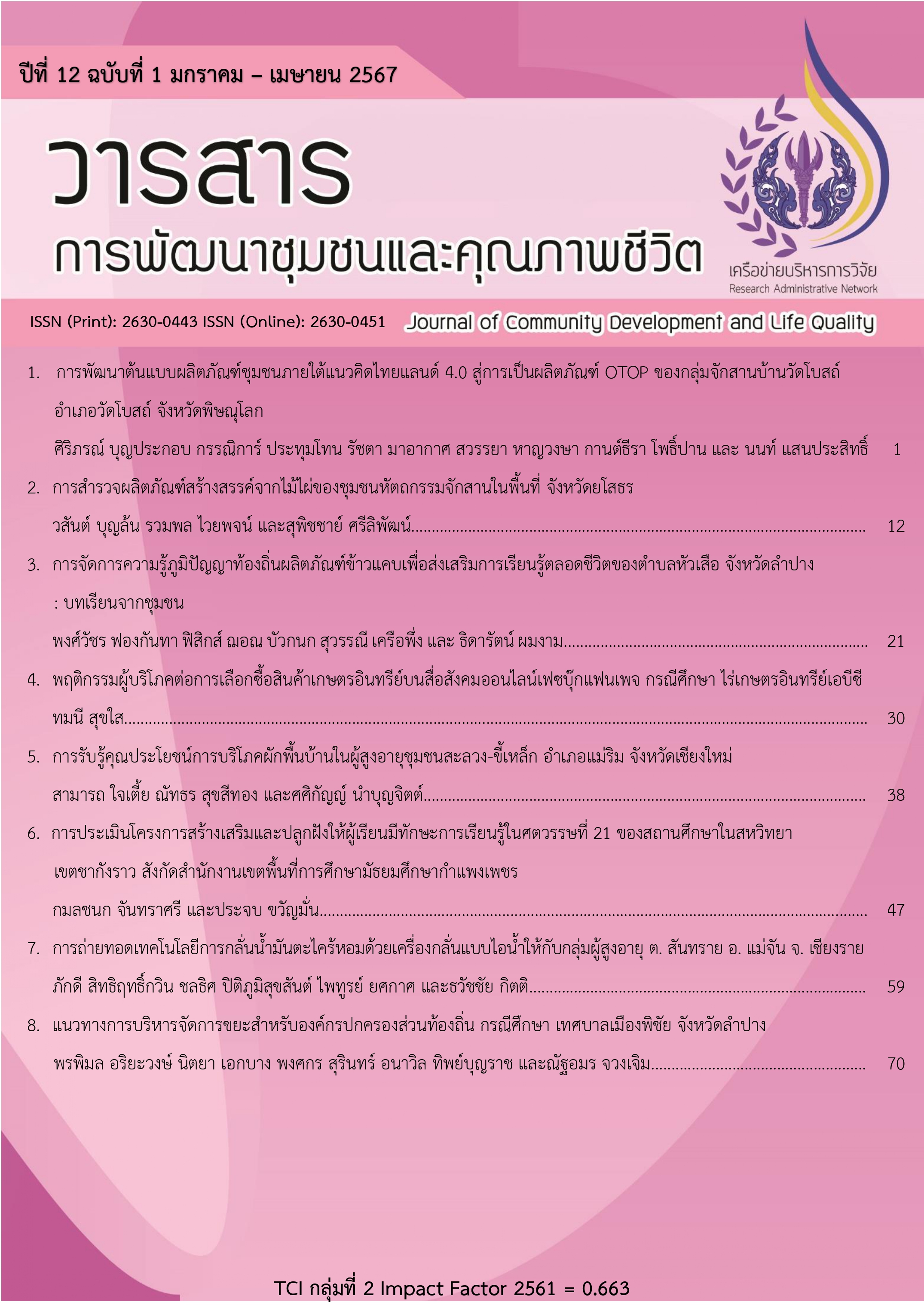แนวทางการบริหารจัดการขยะสำหรับองค์กรปกครองส่วนท้องถิ่น กรณีศึกษา เทศบาลเมืองพิชัย จังหวัดลำปาง
Main Article Content
บทคัดย่อ
บทความวิจัยนี้ศึกษาสถานการณ์ ถอดบทเรียน และพัฒนารูปแบบการขับเคลื่อนการบริหารจัดการขยะของเทศบาลเมืองพิชัย จ.ลำปาง เป็นการวิจัยเชิงคุณภาพเก็บรวบรวมข้อมูลจาก 2 กลุ่มตัวอย่าง คือ 1) บุคลากร เจ้าหน้าที่เทศบาลที่มีหน้าที่เกี่ยวข้องกับการจัดการขยะ 2) ผู้นำและตัวแทนประชาชน 58 คน ใช้เครื่องมือ คือ สัมภาษณ์เชิงลึกและประชุมกลุ่มย่อย นำข้อมูลที่ได้มาวิเคราะห์ และนำเสนอเชิงการสร้างข้อสรุป ให้เหตุผลแบบอุปนัย ตรวจสอบความน่าเชื่อถือของข้อมูลแบบสามเส้า ผลการศึกษาพบว่า ปัจจัยที่ส่งผลให้การบริหารจัดการขยะประสบผลสำเร็จได้แก่การจัดการขยะต้นทาง กลางทาง ปลายทาง และสิ่งสำคัญคือ เกิดนักวิชาการชุมชนด้านการจัดการขยะที่เป็นวิทยากรให้ความรู้แก่ชุมชนอื่น ขยายผลสร้างเครือข่ายชุมชนปลอดขยะ ข้อเสนอแนะ คือสร้างเครือข่ายความร่วมมือกับองค์กรปกครองส่วนท้องถิ่นและเอกชนเพิ่มขึ้น และพัฒนางานสิ่งแวดล้อมศึกษาร่วมกับชุมชน และหน่วยงานอื่น ข้อเสนอเชิงนโยบาย คือ ยกระดับการบริหารจัดการขยะมูลฝอย ให้ความสำคัญกับการถอดบทเรียน ขยายผลความสำเร็จไปสู่วงกว้าง สร้างรูปแบบการจัดการขยะที่เหมาะสมและขับเคลื่อนสู่ระบบการจัดการขยะที่ยั่งยืนต่อไป
Article Details

อนุญาตภายใต้เงื่อนไข Creative Commons Attribution-NonCommercial-NoDerivatives 4.0 International License.
กองบรรณาธิการขอสงวนสิทธิ์ในการตรวจและแก้ไขบทความที่เสนอเพื่อตีพิมพ์ในวารสารการพัฒนาชุมชนและคุณภาพชีวิต
บทความหรือข้อความคิดเห็นใด ๆ ที่ปรากฏในวารสารการพัฒนาชุมชนและคุณภาพชีวิต เป็นวรรณกรรมของผู้เขียนโดยเฉพาะคณะผู้จัดทำไม่จำเป็นต้องเห็นด้วย และไม่ใช่ความรับผิดชอบของมหาวิทยาลัยและคณะผู้จัดทำ / บรรณาธิการ
เอกสารอ้างอิง
Atthakorn, S. 2016. Management: its body of knowledge and the development of theoretical model. Panyapiwat Journal 8(2): 215–226. (in Thai)
Boonyawat, W. 2020. Community participatory waste management of community prototype, “Muang Wan community (Sam Sun Huda Mosque)”, Mahaphram sub-district Bang Ban district, Phra Nakhon Si Ayutthaya. Integrated Social Science Journal, Mahidol University 7(1): 116–134. (in Thai)
Community Development Department. 2017. Guidelines for Establishing and Developing Professional Groups. Community Development Department, Bangkok. 31 p. (in Thai)
Department of Environmental Quality Promotion. 2019. Community Based Solid Waste Management: CBM. Department of Environmental Quality Promotion, Bangkok. 34 p. (in Thai)
Department of Local Administration and Pollution Control Department. 2016. Action plan “Thailand Zero Waste” according to the Participatory “Civil State” Principle 2016 - 2017. Department of Local Administration and Pollution Control Department. Bangkok. 34 p. (in Thai)
Faijumpa, A. 2020. The model development of participation waste management in Jomsi sub-district Administrative Organization, Chiangkhan district Loei province. Journal of Council of Community Public Health 2(1): 1-17. (in Thai)
Incharoen, S., V. Tanvatanakul, K. Rudtanasudjatum and W. Sipon. 2020. Studies related to inspection of municipal solid waste management in Thailand, compared with foreign countries: A systematic review. The Southern College Network Journal of Nursing and Public Health 7(2): 152-166. (in Thai)
Kinnares, P. 2021. Development of participatory waste management model in the cultural tourism of Wat Mahathat community Nakhon Phanom province. Journal of Community Development and Life Quality. 9(3): 366–376. (in Thai)
Kongjun, S., P. Mahasatto, T. Duangpansing,T. Sujaree, and P. Phosing. 2021. Integrated management model of community-based waste. Panya journal 28(2): 137-153. (in Thai)
Office of the National Economic and Social Development Council. 2017. The 12th National Economic and Social Development Plan (2017-2021). Office of the National Economic and Social Development Council, Bangkok. 215 p. (in Thai)
Pollution Control Department. 2016. The Master Plan on National Solid Waste Management B.E. 2559-2564. Pollution Control Department, Bangkok. 238 p. (in Thai)
Pollution Control Department. 2018. Operational manual for 3r (reduce, reuse, recycle) community waste management. Pollution Control Department, Bangkok. 20 p. (in Thai)
Pollution Control Department. 2022. National waste management plan, 2nd edition (B.E. 2565 - 2570). (Online). Available: https://www.pcd.go.th/publication/28745 (July 05, 2023). (in Thai)
Pollution Control Department. 2023. Report on the situation of community solid waste management facilities in Thailand, year 2022. (Online). Available: https://www.pcd.go.th/publication/29509 (July 05, 2023). (in Thai)
Promsit, S. 2019. The large, middle and small sizes of municipality waste management of local government organization in northeast region of Thailand. NEU Academic and Research Journal 9(1): 67–81. (in Thai)
Promsit, S., V. Sanpugdee, S. Kenaphoom, and P. Chaiseeha. 2019. The waste management model and the suitability of the local government organization. Journal of Graduate MCU KhonKaen Campus 6(2): 459–483. (in Thai)
Sankum, P. and N. Sanphoti. 2022. Key success factors in solid waste management of the local government organization at Nakhon Phanom province. UBRU Journal for Public Health Research 11(2): 165–175. (in Thai)
Taweethomjarean, T. 2010. A study of community lifestyle based on the concepts of the social structure theory and community theories. University of the Thai Chamber of Commerce Journal 30(1): 104-116. (in Thai)
Thanawaro (Thipbunthong) P. S., P. Chimhad and D. Khaenamkhaew. 2021. Guidelines of household solid waste management. Journal of Human Society, Nakhon Si Thammarat Rajabhat University 11(2): 80–96. (in Thai)
Thuvanuti, P. and W. Phueakbuakhao. 2018. Waste management guielines of mueang municipality of Prachuab Khiri Khan. Kasem Bundit Journal 19(2): 141-149. (in Thai)
Tongkum, S. and S. Chenchan. 2019. Supply chain management of solid waste of Phaniat sub district, Khok Samrong district, Lopburi province. Journal of Community Development and Life Quality. 7(1): 105–114. (in Thai)


